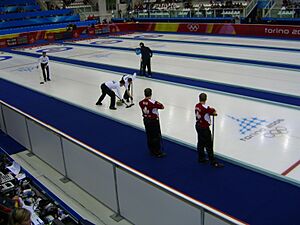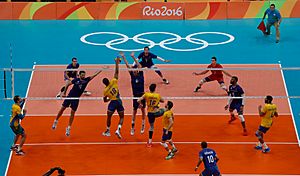Olympic sports facts for kids
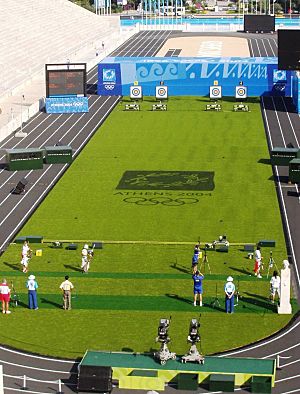
Olympic sports are the amazing athletic competitions held during the Summer Olympic Games and Winter Olympic Games. The 2024 Summer Olympics featured 32 sports, while the 2022 Winter Olympics had seven. Every Olympic sport is managed by a group called an International Federation (IF), which sets the rules for athletes around the world.
The Olympics are always adding exciting new sports. The 2020 Summer Olympics in Tokyo introduced skateboarding, sport climbing, and surfing. Breakdancing made its first appearance at the 2024 Summer Olympics in Paris. Looking ahead, ski mountaineering will debut at the 2026 Winter Olympics, and flag football and squash will join the 2028 Summer Olympics.
Contents
A Look Back in Time
When the modern Olympic Games were started by Pierre de Coubertin, his goal was to include "All games, all nations." He believed that traditional games from different cultures were important.
At the 1904 Summer Olympics, there were special "Anthropology Days" where athletes from Asia, Africa, and South America showed off their local games. However, this idea didn't last long, and for many years, the Olympics mostly featured popular Western sports.
What Counts as an Olympic Sport?
The International Olympic Committee (IOC) has a special way of organizing the Games. A "sport" can be broken down into smaller parts called "disciplines" and "events."
- A sport is a whole category, like Aquatics or Skating.
- A discipline is a specific type of that sport. For example, the sport of Aquatics includes disciplines like swimming, diving, and water polo.
- An event is a specific competition where medals are awarded. In swimming, the "men's 100-meter freestyle" is one event.
Some sports have many disciplines. Skiing has six, including alpine skiing, cross-country skiing, and snowboarding. Gymnastics has three: artistic, rhythmic, and trampoline.
How a Sport Joins the Olympics
For a sport to even be considered for the Olympics, it must be popular worldwide and have an International Federation recognized by the IOC. The committee that organizes each Olympic Games can also suggest new sports to add.
There are limits on how many athletes and events can be in the Games. The Summer Olympics aims for about 10,500 athletes, while the Winter Olympics has a limit of around 2,900 athletes. This helps keep the Games from getting too big.
Interestingly, sports that use engines, like car racing, were once not allowed. This rule was changed in 2016, so it's possible we could see sports like motor racing in the Olympics one day.
How Olympic Sports Have Changed
The list of Olympic sports is always changing. Some sports have been in the Games since the very beginning, while others have been added, removed, and sometimes even brought back.
The Originals
A few summer sports have been in every single Summer Olympics: athletics (track and field), aquatics (swimming), cycling, fencing, and gymnastics.
For the Winter Games, the sports that have never been missed are skiing, skating, and ice hockey.
Comeback Sports
Some sports were part of the early Olympics, disappeared, and then made a triumphant return.
- Archery and Handball came back in 1972.
- Tennis returned in 1988.
- Golf and Rugby (in the form of rugby sevens) came back in 2016.
- Cricket and Lacrosse are set to return for the 2028 Games.
Demonstration Sports
In the past, host countries could showcase a local sport as a "demonstration sport." These were just for show, and medals didn't count. For example, baseball and curling started as demonstration sports before becoming official. This practice was stopped after 1992 to keep the Games from getting too complicated.
Recent Changes
The IOC now allows host cities to propose adding a few sports just for their Games. This is why Tokyo 2020 added sports like karate and surfing. For the Paris 2024 Games, breakdancing was added.
For the 2028 Summer Olympics in Los Angeles, five sports will be added: baseball/softball, cricket, flag football, lacrosse, and squash.
Summer Olympic Sports
The first Olympic Games in 1896 had only ten sports. Over the years, this has grown, and the 2028 Summer Olympics will feature 36 sports. For a sport to be included in the Summer Games, it must be played in at least 75 countries on four continents.
Here is a list of sports that are currently in the Summer Olympics or have been in the past.
Current Summer Sports
- Archery
- Athletics
- Badminton
- Basketball (including 3x3)
- Boxing
- Canoeing (Sprint and Slalom)
- Cycling (BMX, Mountain Bike, Road, Track)
- Diving
- Equestrian (Dressage, Eventing, Jumping)
- Fencing
- Field hockey
- Football (Soccer)
- Golf
- Gymnastics (Artistic, Rhythmic, Trampoline)
- Handball
- Judo
- Modern pentathlon
- Rowing
- Rugby sevens
- Sailing
- Shooting
- Skateboarding
- Sport climbing
- Surfing
- Swimming
- Artistic swimming
- Table tennis
- Taekwondo
- Tennis
- Triathlon
- Volleyball (Indoor and Beach)
- Water polo
- Weightlifting
- Wrestling (Freestyle and Greco-Roman)
Future and Returning Summer Sports (for 2028)
Discontinued Summer Sports
These sports were once part of the Olympics but are no longer on the program.
- Basque Pelota
- Breaking
- Croquet
- Jeu de paume (a type of early tennis)
- Karate
- Polo
- Rackets (similar to squash)
- Roque (an American version of croquet)
- Rugby union
- Tug of war
- Water motorsports
Winter Olympic Sports
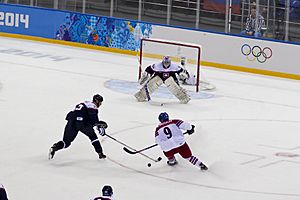
The Winter Olympics began in 1924 to celebrate sports that are played on snow and ice. To be included, a winter sport must be popular in at least 25 countries across three continents.
Current Winter Sports
- Biathlon (a mix of cross-country skiing and rifle shooting)
- Bobsleigh
- Curling
- Ice hockey
- Luge
- Skating (including Figure skating, Short-track speed skating, and Speed skating)
- Skiing (including Alpine, Cross-country, Freestyle, Nordic combined, and Ski jumping)
- Skeleton
- Snowboarding
Future Winter Sports (for 2026)
Recognized Sports Not in the Olympics
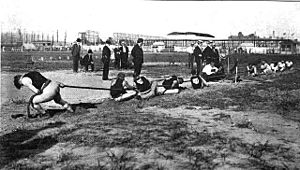
The IOC officially recognizes many other sports that are not currently part of the Olympic Games. These sports have their own international federations and world championships. Some of them might be added to the Olympics in the future.
Many of these sports are part of the World Games, another major international event for sports that are not in the Olympics.
Here are a few examples of recognized sports:
- Air sports (like paragliding and aerobatics)
- Bandy (a team sport on ice, similar to hockey)
- Billiard sports (like pool and snooker)
- Bowling
- Cheerleading
- Chess
- Dancesport
- Floorball
- Korfball
- Lifesaving
- Muaythai (Thai boxing)
- Netball
- Orienteering
- Sumo
- Underwater sports (like finswimming)
- Wushu (a Chinese martial art)
Images for kids
-
Curling was promoted to an official Olympic sport at the 1998 Winter Olympics in Nagano.
-
Volleyball has been part of the Summer Olympics since 1964.
-
Ice hockey was introduced at the 1920 Summer Olympics and then moved to the Winter Games in 1924.
-
Tug of war was contested at the 1904 Summer Olympics. It was later dropped from the Olympic program but remains a recognized sport.
See also
 In Spanish: Deportes olímpicos para niños
In Spanish: Deportes olímpicos para niños
- Association of Summer Olympic International Federations
- Association of International Olympic Winter Sports Federations
- Association of IOC Recognised International Sports Federations
 | DeHart Hubbard |
 | Wilma Rudolph |
 | Jesse Owens |
 | Jackie Joyner-Kersee |
 | Major Taylor |


